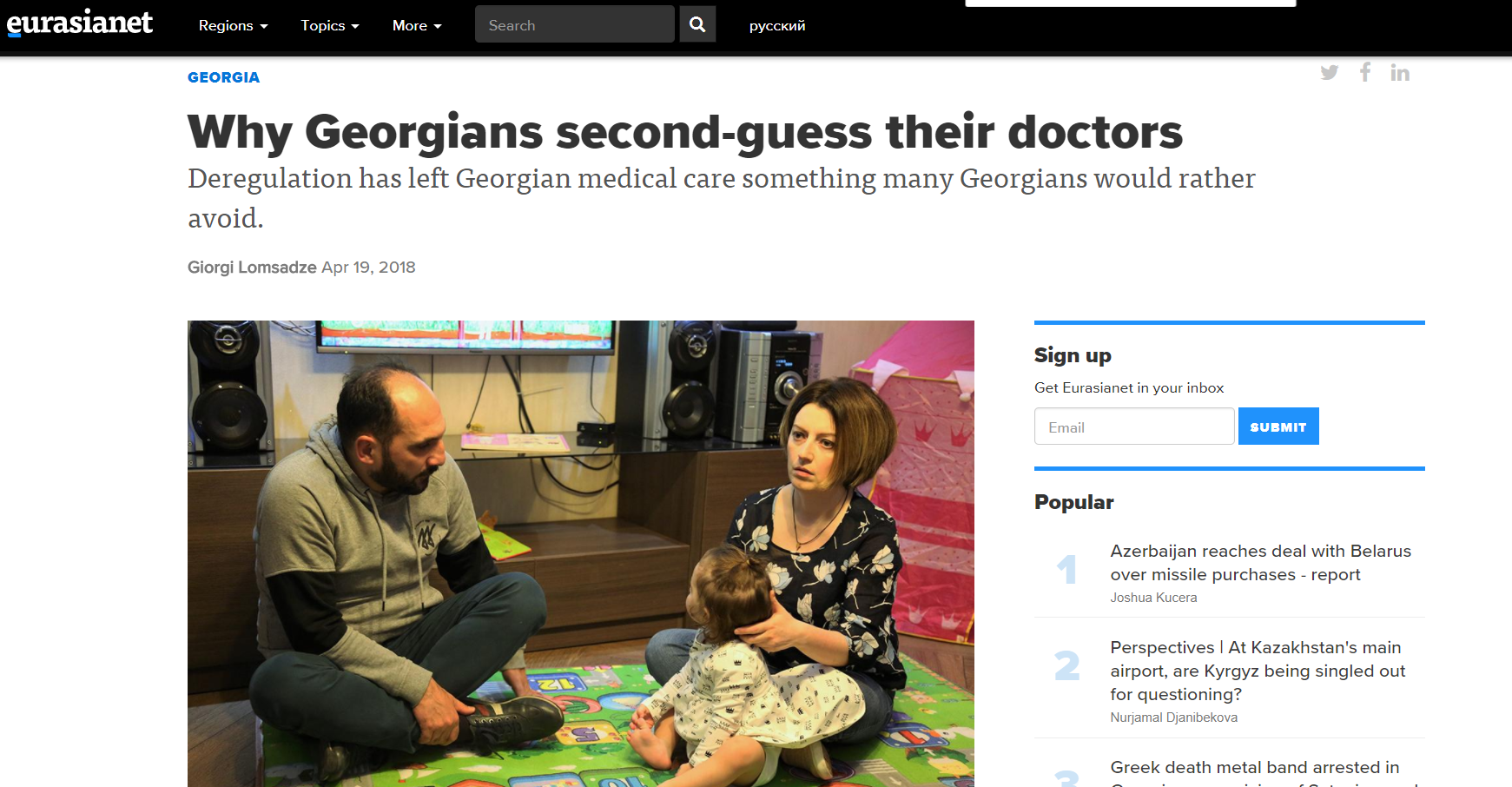[vc_column][vc_simple_slider ids=”6443,6444,6445,6446″][/vc_column][vc_row][vc_column][ultimate_spacer height=”20″][vc_column_text]მსოფლიო 24 მარტს ტუბერკულოზის საერთაშორისო დღეს აღნიშნავს. საერთაშორისო ფონდი კურაციო უერთდება ამ გლობალურ მოძრაობას ტუბერკულოზის დასამარცხებლად.
ბოლო წლებში, ტუბერკულოზი კურაციოს ერთ-ერთი სტრატეგიული კვლევითი მიმართულებაა. მიმდინარე ადგილობრივი და საერთაშორისო პროექტის ფარგლებში ორგანიზაცია მუშაობს ისეთ თემებზე როგორიცაა: ტუბერკულოზის დაფინანსება, ტუბერკულოზის მართვა განვითარებად ქვეყნებში დონორების ფინანსური დახმარების დასრულების შემდეგ, ტუბერკულოზის სფეროში ჩართული ორგანიზაციების გაძლიერება.
ჩვენ გვჯერა, რომ კურაციოს ძალისხმევა ტუბერკულოზის დასამარცხებლად მნიშვნელოვან ძვრებს გამოიწვევს და ერთობლივად დავამარცხებთ ამ საუკუნოვან დაავადებას.
ტუბერკულოზის სფეროში სამედიცინო პერსონალის შედეგზე დაფუძნებული დაფინანსების მოდელის შემუშავება: ღირებულების, მექანიზმებისა და გავლენის შეფასება საქართველოში (შედეგები ტუბერკულოზისთვის)
საერთაშორისო ფონდი კურაციო დედოფალ მარგარეტის სახელობის უნივერსიტეტთან (გაერთიანებული სამეფო), ლონდონის ჰიგიენისა და ტროპიკული მედიცინის სკოლასთან (გაერთიანებული სამეფო) და ანტვერპენის ტროპიკული მედიცინის ინსტიტუტთან (ბელგია) ერთად ახორციელებს კვლევას „ტუბერკულოზის მკურნალობის გამოსავლების გასაუმჯობესებლად სამედიცინო მომსახურების მიმწოდებელთათვის შედეგზე დაფუძნებული დაფინანსების სქემის შემუშავება და შეფასება საქართველოში: ღირებულების, მექანიზმებისა და გავლენის შეფასება“. კვლევითი პროექტი, რომლის ხანგრძლივობა 48 თვეს შეადგენს, საქართველოს მთავრობას ტუბერკულოზის მკურნალობისთვის პროვაიდერების ანაზღაურების წამახალისებელი სისტემის შემუშავებაში დაეხმარება, რომელიც ტუბერკულოზის ამბულატორიული სერვისის გაუმჯობესებაზე იქნება ორიენტირებული. კვლევა შეაგროვებს მტკიცებულებებს, რათა შეფასდეს, თუ რა გავლენას ახდენს დაფინანსების ახალი მოდელი პაციენტებში მკურნალობის დამყოლობაზე და წარმატებული მკურნალობის გამოსავლებზე. კვლევა ასევე განსაზღვრავს თუ რამდენად ხარჯთ-ეფექტურია დაფინანსების ახალი მოდელი.[/vc_column_text][ultimate_spacer height=”20″][vc_simple_slider ids=”6443″][ultimate_spacer height=”20″][vc_column_text]პროექტის ფინანსურ მხარდაჭერას ახორციელებს ჯანდაცვის სისტემების ერთობლივი კვლევის ინიციატივა, რომელსაც ერთობლივად აფინანსებს საერთაშორისო განვითარების დეპარტამენტი (DFID), ეკონომიკისა და სოციალური კვლევის საბჭო (ESRC), სამედიცინო კვლევების საბჭო (MRC) და საქველმოქმედო- სამეცნიერო ფონდი „Wellcome Trust“.
კვლევის ბენეფიციარები არიან ტუბერკულოზით დაავადებული პაციენტები, ტუბერკულოზის მკურნალობის პროცესში ჩართული ექთნები და ექიმები, სამედიცინო დაწესებულების მენეჯერები, გადაწყვეტილების მიმღები პირები, ასევე – საქართველოს, რეგიონისა და მსოფლიოს სამეცნიერო საზოგადოება.
კვლევა შეავსებს შედეგზე დაფუძნებული დაფინანსების მოდელების ირგვლივ არსებული ცოდნის დეფიციტს ისეთ საკითხებზე, როგორიცაა: მათი სახელმწიფო და კერძო სექტორებში გამოყენება და ხარჯ-ეფექტიანობა, მოდელის წარმატების წინაპირობები და სქემის ფუნქციონირების უარყოფითი და/ან დადებითი შედეგები. კვლევა ჩატარდება 3 მეთოდის გაერთიანებით ხარჯთ-ეფექტიანობის, რეალისტური შეფასების და გავლენის შეფასების მეთოდების გამოყენებით და შესაბამისად, წარმოგვიჩენს სიახლეებს, რომლებიც მეთოდების სინთეზურ გამოყენების დროს გამოვლინდება.[/vc_column_text][ultimate_spacer height=”20″][vc_simple_slider ids=”6444″][ultimate_spacer height=”20″][vc_column_text]კვლევის შედეგად მოპოვებულ მტკიცებულებებს გადაწყვეტილების მიმღები პირები გამოიყენებენ ტუბერკულოზის ამბულატორიული სერვისების დაფინანსების რეფორმირებისათვის – უკეთესი შედეგების, ხარისხისა და სერვისების მდგრადობის გაუმჯობესების მიზნით. გარდა ამისა, კვლევის შედეგები სასარგებლო იქნება დაბალი და საშუალო შემოსავლის მქონე სხვა ქვეყნებისთვის, განსაკუთრებით იქ, სადაც ფუნქციონირების ტუბერკულოზის მართვის მსგავსი ვერტიკალური სისტემა (აღმოსავლეთ და ცენტრალური ევროპის ქვეყნები, ასევე ცენტრალური აზიის ყოფილი საბჭოთა რესპუბლიკები) ან სადაც კერძო პროვაიდერები მნიშვნელოვან როლს თამაშობენ ტუბერკულოზთან დაკავშირებული მომსახურების მიწოდებაში.
წაიკითხეთ ბლოგი რომელიც მომზადდა პროექტის დოკუმენტებთან ერთად.
დონორული თანადაფინანსებისა და გარდამავალი პერიოდის პოლიტიკის ზეგავლენის შეფასება ტუბერკულოზის საწინააღმდეგო პრეპარატების შესყიდვაზე
საერთაშორისო ფონდმა კურაციომ ახლახან დაიწყო პროექტის განხორციელება სახელწოდებით: დონორული თანადაფინანსებისა და გარდამავალი პერიოდის პოლიტიკის ზეგავლენის შეფასება ტუბერკულოზის საწინააღმდეგო პრეპარატების შესყიდვაზე. პროექტს ფინანსურად მხარს უჭერს Stop TB Partnership, UNOPS და GDF ინიციატივის ფარგლებში.
პროექტი გაგრძელდება 10 თვის განმავლობაში. იგი მიზნად ისახავს, გლობალური ფონდის (TGF) მდგრადობის, გარდამავალი პერიოდისა და თანადაფინანსების პოლიტიკის (STCP) შესაძლო პოზიტიური და ნეგატიური ზეგავლენის შესწავლას ტუბერკულოზის საწინააღმდეგო მედიკამენტების შესყიდვის პრაქტიკაზე აღმოსავლეთ ევროპისა და ცენტრალური აზიის რეგიონის ქვეყნებში.
ტექნიკური დავალების მიზნიდან გამომდინარე, პროექტის ამოცანებია:
- ტუბერკულოზის საწინააღმდეგო პრეპარატების შესყიდვის პრაქტიკაზე იმ გამოწვევებისა და შესაძლებლობების სისტემატური დოკუმენტირებისა და შეფასებისათვის საჭირო მეთოდოლოგიური მიდგომის შემუშავება, რომლებიც გლობალური ფონდის STCP პოლიტიკის განხორციელებას უკავშირდება;
- შემუშავებული მეთოდოლოგიური მიდგომისა და სტანდარტული ინსტრუმენტების გამოყენებით იმ გამოცდილების სისტემატური შეფასება და დოკუმენტირება, რომელიც უკავშირდება ტუბერკულოზის საწინააღმდეგო პრეპარატების შესყიდვის პრაქტიკას გარდამავალ და მის შემდგომ პერიოდში იმ ქვეყნებში, რომელთაც ამოწურეს გლობალური ფონდის მხარდაჭერის მიღების შესაძლებლობები ან რომლებიც უკვე ახორციელებენ STCP პოლიტიკას და იხდიან ანტიტუბერკულოზური მედიკამენტების შესყიდვის საფასურის გარკვეულ ნაწილს.
პროექტის წარმატებით განხორციელების შემდეგ რეცენზირებად საერთაშორისო ჟურნალში გამოქვეყნდება სამეცნიერო სტატია, რომელშიც აღწერილი იქნება ძირითადი მიგნებები აღმოსავლეთ ევროპისა და ცენტრალური აზიის რეგიონის გამოკვლეულ ყველა ქვეყანაში. პროექტის მიგნებები დაეხმარება ქვეყნებს, იყვნენ ინფორმირებულნი არსებული ხარვეზების შესახებ და მიიღონ სათანადო ზომები სიტუაციის შესაცვლელად.
ტუბერკულოზის მიმართულებით მომუშავე საზოგადოებრივი ორგანიზაციებისა და ჯგუფების გაძლიერების პროექტი საქართველოში
საერთაშორისო ფონდმა კურაციომ განახორციელა ტუბერკულოზის მიმართულებით მომუშავე საზოგადოებრივი ორგანიზაციებისა და ჯგუფების გაძლიერების პროექტი საქართველოში. პროექტი დაიწყო 2016 წელს და მიმდინარეობდა ერთი წლის განმავლობაში.
პროექტის მთავარი ამოცანა იყო ტუბერკულოზზე რეაგირების ინტეგრირებული და კომპლექსური მექანიზმების შექმნა, რომელიც იქნებოდა პაციენტზე ორიენტირებული და ადგილობრივ თემებსა და სამოქალაქო სექტორს შორის ჩამოაყალიბებდა მჭიდრო თანამშრომლობას.[/vc_column_text][ultimate_spacer height=”20″][vc_simple_slider ids=”6445,6446″][ultimate_spacer height=”20″][vc_column_text]პროექტს სამი ძირითადი ამოცანა ჰქონდა: 1) თემის დონეზე ტუბერკულოზზე რეაგირების მიმართულებით სამოქალაქო საზოგადოების ჩართულობის გასაუმჯობესებლად სამართლებრივი და სოციალური გარემოს, ასევე სამოქალაქო საზოგადოების ინსტიტუციური შესაძლებლობების, ასევე – არსებული ჩავარდნებისა და საჭიროებების შეფასება; 2) ტუბერკულოზის სფეროში მოღვაწე სამოქალაქო სექტორის ორგანიზაციების ინსტიტუციური შესაძლებლობების გაუმჯობესება და მდგრადი განვითარების უზრუნველყოფა; 3) ტუბერკულოზის თემატიკით დაინტერსებულ საზოგადოებას, სამოქალაქო სექტორის ორგანიზაციებს, სახელმწიფო სტრუქტურებსა და სხვა სუბიექტებს შორის კავშირების, კოორდინაციისა და საქმიანი ურთიერთობების გაუმჯობესება.
საერთაშორისო ფონდმა კურაციომ აღრიცხა ტუბერკულოზის თემატიკაზე მომუშავე ყველა სამოქალაქო საზოგადოებრივი ორგანიზაცია საქართველოში. ეს სამუშაო დაფინანსდა „შევაჩეროთ ტუბერკულოზი“ პარტნიორობის მიერ CFCS პროგრამის მე-7 რაუნდის ფარგლებში. შეიქმნა ამ პროფილით მომუშავე სამოქალაქო საზოგადოებრივი ორგანიზაციების საინფორმაციო კატალოგი, რომელიც ხელმისაწვდომია შემდეგ ბმულზე.
საერთაშორისო ფონდ კურაციოს ხელშეწყობით „საქართველოს კოალიცია ტუბერკულოზის წინააღმდეგ” დარეგისტრირდა როგორც იურიდიული პირი და გატარდა რიგი ღონისძიებებისა კოალიციის ინსტიტუციური შესაძლებლობების განსავითარებლად. პროექტის მნიშვნელოვანი მიღწევა იყო ქვეყნის საკოორდინაციო მექანიზმის ორგანიზებით ჩატარებული სამოქალაქო საზოგადოებრივი ორგანიზაციების ბოლო ფორუმზე კოალიციის მიერ საქართველოში ტუბერკულოზთან ბრძოლის მხარდასაჭერად რამდენიმე ინიციატივის გაჟღერება და მათი საჯარო დაცვა.[/vc_column_text][ultimate_spacer height=”20″][/vc_column][/vc_row][vc_row][vc_column width=”1/1″][/vc_column][/vc_row]

